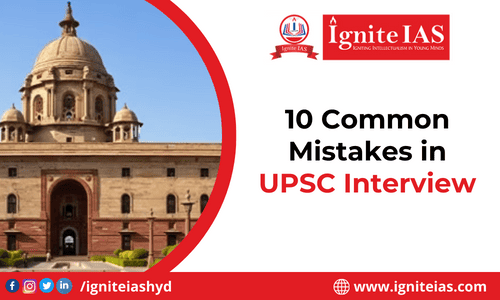Introduction:
The UPSC interview, also known as the Personality Test, is the final stage of the Civil Services Examination. It is a crucial phase where candidates’ personality traits, communication skills, and overall suitability for a career in civil services are evaluated. Despite thorough preparation, many candidates make common mistakes during the interview that could potentially affect their performance. Let’s delve into the 10 most common mistakes made by candidates during the UPSC interview.
- Lack of Confidence:
One of the most prevalent mistakes is a lack of confidence. Candidates often undermine their abilities, leading to nervousness and hesitation during the interview. Confidence is key to showcasing your knowledge and abilities effectively. - Inadequate Knowledge:
Candidates sometimes lack comprehensive knowledge about current affairs, socio-economic issues, and government policies. It’s crucial to stay updated with recent developments and have a deep understanding of various subjects relevant to the exam. - Poor Communication Skills:
Effective communication is essential for conveying ideas succinctly and articulately. Candidates may falter due to poor language proficiency, unclear expression, or inability to structure their thoughts coherently. - Overconfidence:
While confidence is necessary, overconfidence can be detrimental. Candidates who come across as arrogant or dismissive may leave a negative impression on the interview panel. It’s essential to strike a balance between confidence and humility. - Ignoring Body Language:
Body language plays a significant role in communication. Candidates often overlook non-verbal cues such as posture, eye contact, and gestures. Maintaining appropriate body language conveys professionalism and attentiveness. - Lack of Preparation:
Some candidates fail to prepare adequately for the interview, assuming that their knowledge from the written exam is sufficient. Preparation should include mock interviews, self-assessment, and refining responses to commonly asked questions. - Inconsistent Responses:
Candidates may provide inconsistent or contradictory responses, indicating a lack of clarity or conviction in their beliefs. It’s essential to maintain coherence and consistency throughout the interview. - Emotional Instability:
The interview panel may intentionally evoke emotional responses to assess candidates’ resilience and maturity. Candidates who display emotional instability or agitation may struggle to handle the challenges of the civil services role effectively. - Negative Attitude:
A negative attitude towards certain questions or topics can reflect poorly on the candidate’s adaptability and open-mindedness. It’s important to approach each question with a positive and constructive mindset. - Failure to Listen:
Candidates sometimes fail to listen attentively to the questions asked by the panel, leading to irrelevant or incomplete responses. Active listening is crucial for understanding the question thoroughly and providing a relevant answer.
FAQ’s:
1. What is the UPSC interview, and how important is it?
The UPSC interview, also known as the Personality Test, is the final stage of the Civil Services Examination. It holds significant importance as it evaluates candidates’ personality traits, communication skills, and suitability for a career in civil services.
2. How should I prepare for the UPSC interview?
Preparation for the UPSC interview should include thorough knowledge of current affairs, socio-economic issues, and government policies. Additionally, practicing mock interviews, refining communication skills, and staying updated with recent developments are essential.
3. What kind of questions can I expect during the UPSC interview?
Questions in the UPSC interview can range from personal background and hobbies to current affairs, ethical dilemmas, and socio-economic issues. It’s important to be well-versed in a wide range of subjects and be prepared to articulate your thoughts effectively.
4. How long does the UPSC interview last?
The UPSC interview typically lasts for about 30-45 minutes, during which candidates are assessed on various aspects of their personality, knowledge, and suitability for a career in civil services.
5. How can I overcome nervousness during the UPSC interview?
To overcome nervousness, candidates can practice relaxation techniques such as deep breathing and positive visualization. Additionally, thorough preparation and mock interviews can boost confidence and reduce anxiety.
6. What should I wear for the UPSC interview?
Candidates should dress formally and conservatively for the UPSC interview, opting for well-fitted suits or traditional attire. Neat grooming and minimal accessories are advisable to maintain a professional appearance.
7. How important is body language during the UPSC interview?
Body language is crucial during the UPSC interview as it conveys confidence, professionalism, and attentiveness. Maintaining good posture, making eye contact, and using appropriate gestures can positively influence the interview panel.
8. What should I do if I don’t know the answer to a question during the UPSC interview?
If unsure about an answer, candidates should remain calm and honest. They can acknowledge their lack of knowledge politely and express willingness to learn more about the topic if given the opportunity.
9. How can I demonstrate my leadership skills during the UPSC interview?
Candidates can showcase their leadership skills by providing examples of situations where they took initiative, delegated tasks, and achieved positive outcomes. Highlighting experiences of teamwork, decision-making, and problem-solving is also beneficial.
10. What qualities are the UPSC interview panel looking for in candidates?
The UPSC interview panel looks for candidates who demonstrate integrity, empathy, critical thinking, effective communication, leadership potential, and a genuine commitment to public service. Showing a well-rounded personality and a positive attitude towards challenges is key to making a favorable impression.
Conclusion:
Avoiding these common mistakes can significantly enhance your performance in the UPSC interview. By cultivating confidence, improving communication skills, and maintaining a positive attitude, candidates can maximize their chances of success in this crucial stage of the examination process. At Ignite IAS, we provide comprehensive guidance and support to help our students excel in the interview and realize their dream of becoming civil servants.




